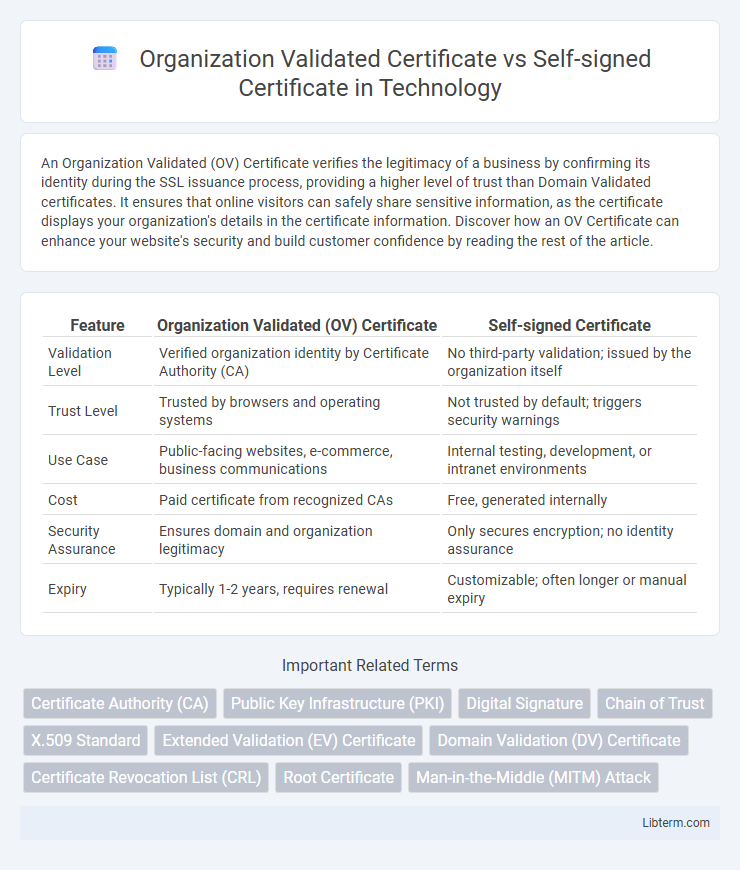An Organization Validated (OV) Certificate verifies the legitimacy of a business by confirming its identity during the SSL issuance process, providing a higher level of trust than Domain Validated certificates. It ensures that online visitors can safely share sensitive information, as the certificate displays your organization's details in the certificate information. Discover how an OV Certificate can enhance your website's security and build customer confidence by reading the rest of the article.
Table of Comparison
| Feature | Organization Validated (OV) Certificate | Self-signed Certificate |
|---|---|---|
| Validation Level | Verified organization identity by Certificate Authority (CA) | No third-party validation; issued by the organization itself |
| Trust Level | Trusted by browsers and operating systems | Not trusted by default; triggers security warnings |
| Use Case | Public-facing websites, e-commerce, business communications | Internal testing, development, or intranet environments |
| Cost | Paid certificate from recognized CAs | Free, generated internally |
| Security Assurance | Ensures domain and organization legitimacy | Only secures encryption; no identity assurance |
| Expiry | Typically 1-2 years, requires renewal | Customizable; often longer or manual expiry |
Introduction to Digital Certificates
Organization Validated (OV) Certificates provide verified business identity information, ensuring trustworthiness through a rigorous validation process by Certificate Authorities (CAs). In contrast, Self-signed Certificates are generated and signed by the same entity, offering basic encryption without third-party validation, leading to limited trust in browsers and systems. Digital Certificates act as a foundation for secure communication by authenticating websites and enabling encrypted data transmission.
What is an Organization Validated (OV) Certificate?
An Organization Validated (OV) Certificate is a type of SSL certificate that requires thorough identity verification of the organization before issuance, ensuring the website owner's legitimacy. This validation process involves confirming the company's legal, physical, and operational existence, providing higher trust for users compared to Self-signed Certificates. OV Certificates are widely used by businesses to enhance security and build customer confidence through verified organizational information displayed in the certificate details.
Understanding Self-signed Certificates
Self-signed certificates are SSL/TLS certificates that are signed by the entity creating them rather than a trusted Certificate Authority (CA), often used for internal testing or encryption within controlled environments. They lack third-party validation, which leads to browsers and systems flagging them as insecure or untrusted due to the absence of a verified certificate chain. While cost-effective and easy to generate, self-signed certificates do not provide the identity assurance or trust required for public-facing websites, unlike Organization Validated (OV) certificates that undergo rigorous verification.
Key Differences: OV Certificate vs Self-signed Certificate
Organization Validated (OV) Certificates are issued by trusted Certificate Authorities (CAs) after rigorous verification of the organization's identity, ensuring enhanced trust and security for users. Self-signed Certificates, generated and signed by the organization itself, lack third-party validation, making them susceptible to trust warnings and potential man-in-the-middle attacks. OV Certificates support strong encryption and are widely recognized by browsers, whereas Self-signed Certificates are typically used for internal testing or development purposes due to their limited trust scope.
Trust and Authentication in Web Security
Organization Validated (OV) Certificates provide verified trust by authenticating the legitimacy of the business behind a website, ensuring users that the organization is legally registered and operational. Self-signed Certificates lack third-party validation, offering encryption but failing to establish trust, often triggering browser warnings that deter users. In web security, OV Certificates enhance authentication by confirming organizational identity, whereas self-signed certificates primarily secure data without guaranteeing authenticity.
Validation Processes Explained
Organization Validated (OV) Certificates undergo a rigorous validation process where Certificate Authorities (CAs) verify the legal identity, physical address, and domain ownership of the organization requesting the certificate. This vetting ensures the entity behind the website is legitimate, reducing risks of phishing and increasing user trust. Self-signed certificates are created and signed by the same entity without external verification, offering limited trust and increased vulnerability to man-in-the-middle attacks due to the lack of third-party validation.
Use Cases: When to Use OV vs Self-signed Certificates
Organization Validated (OV) Certificates are ideal for businesses seeking to establish trust with customers through verified identity, making them suitable for public-facing websites, e-commerce platforms, and corporate intranets. Self-signed certificates are best used in internal networks, development environments, or testing scenarios where encryption is needed but third-party validation is not required. OV Certificates ensure enhanced security and trustworthiness preferred for compliance and user assurance, while self-signed certificates offer cost-effective encryption without external verification.
Security Risks and Vulnerabilities
Organization Validated (OV) Certificates provide stronger security by verifying the organization's identity through a trusted Certificate Authority (CA), reducing the risk of phishing and man-in-the-middle attacks. In contrast, Self-signed Certificates lack third-party validation, making them vulnerable to spoofing, unauthorized access, and trust issues in browsers. The absence of CA verification in self-signed certificates exposes users to higher security risks due to potential malicious use and difficulty in detecting certificate tampering.
Cost and Management Considerations
Organization Validated (OV) Certificates typically incur higher costs due to third-party validation and issuance fees, while Self-signed Certificates are free but lack trusted authority verification. OV Certificates require consistent management, including renewal and identity verification, ensuring enhanced security and trustworthiness compared to self-signed alternatives. Conversely, Self-signed Certificates demand in-house management and distribution, increasing administrative overhead and potential compatibility issues across systems.
Choosing the Right Certificate for Your Organization
Organization Validated (OV) Certificates provide verified identity assurance by validating the organization's legitimacy, making them ideal for businesses requiring trust and credibility in online transactions. Self-signed Certificates offer encryption but lack third-party validation, leading to trust warnings in browsers and are generally suited for internal testing or development environments. Choosing the right certificate depends on the level of trust needed: OV Certificates enhance customer confidence with verified credentials, while self-signed Certificates are cost-effective for non-public-facing applications.
Organization Validated Certificate Infographic

 libterm.com
libterm.com